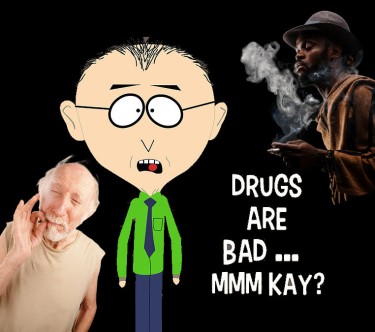
The Subjective Morality of Drugs
The question of whether drugs are inherently good or bad has been a topic of debate for centuries.
Society often labels certain substances as “bad drugs” while accepting others as “good.” But how do we measure the morality of a drug? Is it based on its legal status, cultural acceptance, or perceived health risks?
Assessing the “goodness” or “badness” of a drug is a complex task, as it involves considering various factors such as individual health, social impact, and potential for abuse. However, even these factors are subject to cultural and personal biases. What one society deems acceptable, another may view as a moral failing.
This raises the question: Can we truly use morality as a filter to determine whether a drug is good or bad? Moreover, who is the arbiter of this morality? Is it the government, religious institutions, or public opinion?
Remember, Jeff Session said, “Good people don’t use marijuana“, and he was Attorney General of the United States.
Interestingly, most people are active drug users, often without realizing it. The world’s most widely consumed psychoactive drug, caffeine, is found in coffee, tea, and various other beverages and foods. Yet, we rarely question the morality of consuming this socially accepted substance.
In this article, we will explore the subjective morality surrounding drugs, challenging the notion that they can be neatly categorized as either good or bad. By examining the hypocrisy in our attitudes towards different substances, we aim to shed light on the complex relationship between humans and the psychoactive compounds we consume.
A drug, in its broadest sense, is any chemical substance that, when consumed, has a physiological effect on the body. This definition encompasses a wide range of substances, from prescription medications to recreational drugs, and even includes everyday substances like caffeine and sugar.
If we accept this expansive definition, it becomes clear that the majority of the world’s population are, in fact, regular drug users.
Substances like caffeine, alcohol, and sugar are consumed daily by billions of people worldwide, often without a second thought.
Let’s take coffee as an example. According to the National Coffee Association, approximately 62% of Americans drink coffee every day, with an average consumption of three cups per day. Globally, over 2.25 billion cups of coffee are consumed each day, making it one of the most popular beverages in the world. Coffee contains caffeine, a stimulant that affects the central nervous system, improving alertness and reducing fatigue.
Similarly, sugar is added to countless food products and is consumed in vast quantities. The World Health Organization reports that the average person consumes around 24 kilograms of sugar per year. Sugar has been shown to have addictive properties and can lead to various health problems when consumed in excess, such as obesity, diabetes, and heart disease.
Despite their widespread use and potential for harm, substances like coffee and sugar are rarely subjected to the same moral scrutiny as illegal drugs like cannabis, cocaine, or heroin. This discrepancy raises questions about the consistency and validity of our moral judgments regarding drug use.
One reason for this inconsistency may be the legal status and cultural acceptance of certain substances. Alcohol, for example, is legal in most countries and is often associated with social gatherings and celebrations. In contrast, drugs like cannabis and cocaine are illegal in many jurisdictions and are often stigmatized as dangerous and morally corrupt.
However, the legal status and cultural acceptance of a substance do not necessarily reflect its potential for harm or addiction. Alcohol, for instance, is responsible for millions of deaths worldwide each year and can lead to severe health problems and addiction.
In light of these considerations, it becomes clear that our moral judgments about drugs are often inconsistent and influenced by factors beyond the inherent properties of the substances themselves.
By recognizing the widespread use of drugs in our society and the arbitrary nature of our moral distinctions, we can begin to have a more honest and nuanced conversation about drug use and its consequences.
We can move away from the “morality of drugs” and enter into the realm of the “science of drugs.”
Throughout history, various movements have used morality as a tool to push for the prohibition of certain drugs. These campaigns often relied on fear-mongering, racism, and sexual stigmatization to advance their agendas.
One notable example is the temperance movement of the early 20th century, which sought to ban alcohol in the United States. Proponents of the movement argued that alcohol consumption was a moral failing that led to poverty, domestic violence, and societal decay. Interestingly, they also used sexual purity as a motivator, suggesting that alcohol use led to promiscuity and the erosion of traditional family values.
This moralistic rhetoric ultimately contributed to the passage of the 18th Amendment, which ushered in the era of Prohibition.
Similarly, the prohibition of marijuana in the United States has its roots in racism and moral panic. In the early 1900s, cannabis was associated with Mexican immigrants, who were blamed for various social problems. The media fueled this narrative with sensationalized stories, such as the infamous “Reefer Madness” film, which depicted marijuana use as a gateway to violence, sexual deviancy, and insanity.
By portraying cannabis as a threat to moral society, proponents of prohibition were able to pass the Marihuana Tax Act of 1937, effectively criminalizing the drug.
The story of opium prohibition also has a dark history of racism and moral judgment. In the late 1800s, Chinese immigrants were instrumental in building America’s railroads. Many of these workers used opium, which was legal at the time, to cope with the harsh working conditions and loneliness.
However, as anti-Chinese sentiment grew, opium use became a target for moral crusaders. They portrayed Chinese immigrants as morally depraved and a threat to white society, using this rhetoric to push for the Chinese Exclusion Act of 1882 and, eventually, the Harrison Narcotics Tax Act of 1914, which restricted opium use.
Looking back at the history of prohibition, it becomes clear that these policies were often rooted in prejudice, fear, and a misguided sense of morality.
The consequences of these actions have been devastating, leading to the criminalization of large segments of the population, the rise of organized crime, and the perpetuation of harmful stereotypes.
Today, we continue to grapple with the stigma and moral judgments that our predecessors attached to drug use. The War on Drugs, launched in the 1970s, has disproportionately targeted communities of color and has led to mass incarceration, while doing little to address the root causes of addiction and drug abuse.
In light of this history, it is important to recognize that prohibition itself, not the drugs it aims to suppress, is often the true source of immorality.
By perpetuating harmful stereotypes, fueling racial discrimination, and criminalizing individuals who need help, prohibition has caused immense harm to society.
As we move forward, it is crucial that we reexamine our moral assumptions about drug use and work towards policies that prioritize public health, compassion, and evidence-based approaches to addiction and substance abuse. Only by confronting the misguided morality of prohibition can we hope to build a more just and equitable society.
As we’ve explored throughout this article, the question of whether drugs are inherently good or bad is a complex one, deeply entangled with historical, cultural, and moral perceptions.
We are left with the realization that morality may have little bearing on the objective effects of drugs, as individual beliefs and societal norms often shape what is considered acceptable or deviant.
If we accept that drugs are amoral—that is, void of intrinsic moral classifications—then our approach to drug policy should be guided by scientific evidence and empirical data, rather than subjective moral judgments.
Under this lens, we might find that alcohol, a substance responsible for countless deaths and social ills, would be classified as a Schedule I drug, while substances like sugar and caffeine, which also have addictive properties and potential health risks, would face greater regulation.
Yet, despite the evidence, we find ourselves grappling with the morals of a bygone era, which continue to dictate our relationship with the substances we consume.
The War on Drugs, born out of fear, racism, and moral panic, has led to devastating consequences, from mass incarceration to the stigmatization of addiction, while failing to address the complex social and economic factors that contribute to substance abuse.
It is time for us to break free from the shackles of outdated moral perceptions and embrace a new approach to drug policy—one that prioritizes harm reduction, public health, and individual liberty.
By dismantling the Controlled Substance Act and reevaluating our entire framework for regulating drugs, we can begin to address the root causes of addiction and provide support for those who need it most.
As we move forward, let us not allow the moral judgments of the past to dictate the policies of the future. Instead, let us chart a new course, guided by compassion, reason, and a commitment to evidence-based solutions.
Only then can we hope to build a society that truly promotes the well-being of all its members, regardless of their relationship with drugs.
THE MORAL JUDGEMENT ON DRUGS, READ ON…
ARE YOU A GOOD OR BAD PERSON IF YOU SMOKE WEED? MORALITY CLAUSE!
- SEO Powered Content & PR Distribution. Get Amplified Today.
- PlatoData.Network Vertical Generative Ai. Empower Yourself. Access Here.
- PlatoAiStream. Web3 Intelligence. Knowledge Amplified. Access Here.
- PlatoESG. Carbon, CleanTech, Energy, Environment, Solar, Waste Management. Access Here.
- PlatoHealth. Biotech and Clinical Trials Intelligence. Access Here.
- Source: http://cannabis.net/blog/opinion/drugs-are-bad-mmmkay-the-subjective-morality-around-cannabis-and-other-drugs




